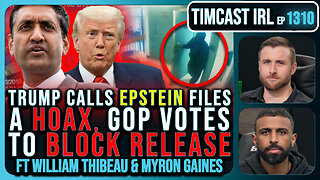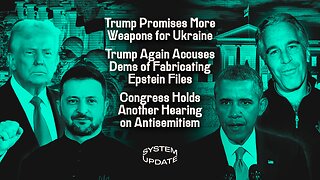Premium Only Content

Judge Napolitano: Engoron's decision against Trump was government theft
Popular legal commentator Judge Andrew Napolitano says Arthur Engoron's decision in New York to fine President Donald Trump and his companies hundreds of millions of dollars was no more or less than "government theft."
In a column at the Washington Times, he said the "$400 million" was a "gargantuan punishment."
But he said it was not "for any crime committed or harm caused."
"It was government theft at its worst."
Engoron, a judge who openly was antagonistic to Trump, claimed that Trum committed fraud in the way he valued his billions of dollars in property. Yet the banks doing business with him claimed no fraud, all the loans were repaid in full and there were no victims.
Yet Engoron claimed to know more about property values than anyone, insisting that Trump's Mar-a-Lago home was worth not even $20 million. Actual real estate experts said it would be worth 25 times that, or more.
Napolitano cited a common understanding in tort law that "an injured party can seek damages only for a wrong actually caused."
"The law does not concern itself with trifles or with theoretical wrongs," he explained. "Where there is no harm, there can be no remedy."
He explained, "Were this not the case, then a crazy plaintiff could drag a hapless defendant into court for all sorts of fanciful or theoretical or immeasurable or speculative claims — none of which caused harm."
Accompanying that principle is the idea that remedies are at hand only where "a duty is owed and breached and where the breach caused measurable damages."
He noted, "Stated differently, if I punch you in the nose, you can sue me for pain and suffering and permanent injury if there is any. But your sister, who learns later what I did to you, cannot sue me. In this scenario, I owed you a duty not to hit your nose, and I breached that duty. And my breach caused you damages and the remedy you properly sought is compensation for the damages. I also owed a duty not to punch your sister in the nose, but I didn’t breach that duty.
"This is basic Anglo-American tort law as practiced and understood for more than 600 years."
The government's only role is to be a neutral and credible forum for resolution, he said.
"Were the government to enter the dispute as a litigant or were to claim some harm where none existed, however, it would do violence to these basic legal principles, and it would impair my natural and constitutional rights to own property. If it were successful, it would constitute theft for its own benefit," he wrote.
That's what Engoron did, at the insist of Attorney General Letitia James, who campaigned on the agenda of "getting" Trump.
His analysis continued, "The government created a phantom harm by arguing to the court that Mr. Trump’s corporation was not fully accurate in its loan applications and thus was charged a lower interest rate on the loans than it should have been charged had it been accurate, and thus, it earned more income on its use of the money it borrowed than would have been the case had it scrupulously reported the value of its pledged assets. And thus — somehow — the government ought to be able to confiscate the excess income plus interest. This, of course, defies the principles of no damages without breach of a duty and no damages without caused harm, which have been the bedrock of American tort law. It also redefines fraud."
The court's failing was that it didn't recognize that the banks involved "did their own due diligence on the value of the assets he pledged, and they told the court that they were satisfied with Mr. Trump’s valuations."
And they told Engoron every loan was paid in full, with interest.
But Napolitano said the government abandoned the definition of "fraud," which has been used for 600 years.
What Jams and Engoron did, he said, was to show up after the fact and claim "harm."
"The government won’t say how it was harmed by Mr. Trump’s commercial loans because it wasn’t harmed by them. The government lawyers made a fanciful argument to the effect that if Mr. Trump had borrowed less because the buildings pledged as security were worth less than he claimed, the banks would have had more reserves available to lend to others. That is nonsense," Napolitano said.
The real harm in the case, he charged, is from James and Engoron and inflicted on the "rule of law."
"The government enacted a statute that permitted it to claim harm where none existed and then steal from a wealthy entity; and a judge — sworn to uphold the Constitution — let the government get away with it."
-
 1:58:04
1:58:04
FreshandFit
4 hours agoWhy Women Are Always Single?
104K23 -
 1:12:39
1:12:39
Man in America
12 hours agoThe Frightening Truth About Weather Warfare & Depopulation w/ Kim Bright
103K42 -
 2:59:21
2:59:21
TimcastIRL
6 hours agoTrump Calls Epstein Case A HOAX By Democrats, GOP Votes TO BLOCK Release | Timcast IRL
226K246 -
 10:17
10:17
Dr Disrespect
14 hours agoIt's Time To Get Serious
26.3K9 -
 DVR
DVR
SpartakusLIVE
8 hours agoDuos w/ Sophie || Charity stream tomorrow!
57.8K -
 58:43
58:43
Sarah Westall
6 hours agoBecause Voluntary Extermination is a Thing: Israel-Gaza w/ Award Winning Journalist James Robins
42.7K11 -
 4:44:13
4:44:13
BubbaSZN
7 hours ago🔴 LIVE - TRYING TO NOT BUST A$$ THIS TIME (THPS3+4)
26.5K1 -
 8:42:11
8:42:11
sophiesnazz
11 hours ago $1.71 earnedGENUINE BELTERS IN ERE l LIVE WITH @SpartakusLIVE!socials
41.5K1 -
 1:15:18
1:15:18
Glenn Greenwald
8 hours agoTrump Promises More Weapons for Ukraine; Trump Again Accuses Dems of Fabricating Epstein Files | SYSTEM UPDATE #487
137K86 -
 3:48:04
3:48:04
This is the Ray Gaming
4 hours ago $0.87 earnedTuesday Night is FOR THE BOYS | Rumble Premium Creator
17.9K2